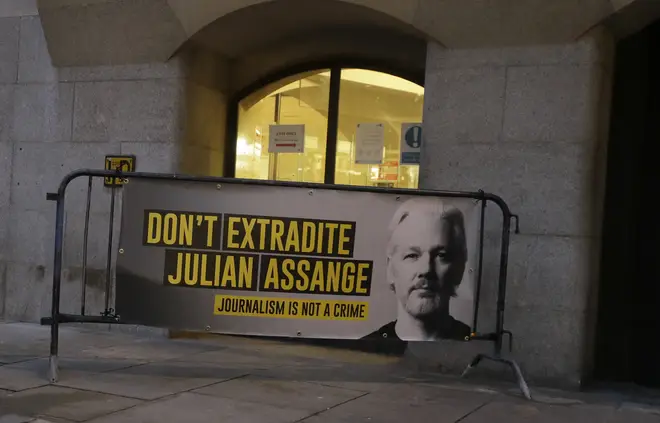
Ali Miraj 12pm - 3pm
4 January 2021, 11:10 | Updated: 4 January 2021, 12:31

WikiLeaks founder Julian Assange cannot be extradited to the US on espionage charges, a judge at the Old Bailey has ruled.
The London court blocked a US request to hand over Mr Assange to American authorities due to real concerns over his mental health.
District Judge Vanessa Baraitser said it would be “oppressive” to extradite the 49-year-old while detailing evidence of his self-harm and suicidal thoughts.
"The overall impression is of a depressed and sometimes despairing man fearful for his future," she said.
The US Government has said it will appeal the decision and therefore the WikiLeaks founder will be kept in the high-security Belmarsh Prison where he can make a fresh application for bail.
Mr Assange, who sat in the dock of Court 2, closed his eyes upon hearing he had won his fight to avoid extradition.
Read more: PM confirms tougher new Covid measures to be announced soon
Read more: Trump told Georgia election chief to 'find' votes in unearthed tapes

Washington previously requested the activist be handed over to US authorities over the leak of thousands of American military documents in 2010 and 2011 relating to the Afghanistan and Iraq wars, as well as diplomatic cables.
Prosecutors argue that the release of such classified information put the lives of US informants in danger.
They also claim Mr Assange helped US defence analyst Chelsea Manning breach the Espionage Act in unlawfully obtaining material and that he was complicit in hacking by others
The journalist is facing an 18-count indictment, alleging a plot to hack computers and a conspiracy to obtain and disclose national defence information.
However, the former editor's legal team have claimed the prosecution - under President Donald Trump's administration - is politically motivated and that Mr Assange is a high suicide risk if he is extradited.
Read more: Nora Quoirin death in Malaysia most likely misadventure - coroner
Read more: Oxford-AstraZeneca vaccine given to first UK patient

The 49-year-old, who has been diagnosed with Asperger's syndrome and severe depression, denies plotting with Ms Manning to crack an encrypted password on US Department of Defence computers and says there is no evidence that anyone's safety was put at risk.
In her judgment, Judge Baraitser referred to the evidence of Mr Assange's mental state.
She said that "facing conditions of near-total isolation" in US custody, she was satisfied that authorities there would not be able to prevent the journalist from "finding a way to commit suicide".
His lawyers had said he faced up to 175 years in jail if convicted, although the US Government said the sentence was more likely to be between four and six years.
The activist wiped his brow after the decision was announced while his fiancee, Stella Moris, with whom he has two young sons, wept.
Julian Assange will NOT be extradited to America. An excellent ruling by the British judge. Congratulations to all the dogged campaigners on Assange’s behalf. https://t.co/TBz7poH4Db
— Diane Abbott MP (@HackneyAbbott) January 4, 2021
She was embraced by WikiLeaks editor-in-chief Kristinn Hrafnsson, who sat next to her in court as the judgment was delivered.
The prosecution has given notice of appealing over the decision and have 14 days to lodge their grounds.
In her ruling, the judge rejected the defence arguments of freedom of speech and that the prosecution was politically motivated.
She said: "If the allegations are proved then the agreement with Ms Manning and other groups of computer hackers took him outside any role of investigative journalism.
"He was acting to further the overall objective of WikiLeaks to obtain protected information by hacking, if necessary."
The judge said Mr Assange's dealings with Ms Manning "went beyond the mere encouragement of a journalist".
Good news Julian Assange's extradition has been blocked. Extradition treaties should not be used for political prosecutions. https://t.co/PEWhgow7Kb
— David Davis (@DavidDavisMP) January 4, 2021
She said the former editor was "well aware" of the danger to informants by disclosing unredacted names in leaked documents.
If his conduct was proved it would amount to offences in this jurisdiction and he would not be protected by freedom of speech, she explained.
The judge added: "Free speech rights don't provide unfettered discretion for some, like Mr Assange, to decide the fate of others."
On the claim that the charges were politically motivated, she said: "There was insufficient evidence to find the prosecutors responsible for bringing these charges were pressurised by the Trump administration.
"There is little or no evidence to indicate hostility by President Trump to Mr Assange or WikiLeaks."
The extradition request was not decided on press freedom grounds; rather, the judge essentially ruled the US prison system was too repressive to extradite. However, the result will protect journalists everywhere.
— Freedom of the Press (@FreedomofPress) January 4, 2021
She continued: "I accepted Mr Assange has political opinions. However, I was satisfied that the federal prosecutors who acted to bring these charges did so in good faith."
Former shadow home secretary Diane Abbott wrote on Twitter that the decision not to allow the extradition was an "excellent ruling by the British judge".
"Congratulations to all the dogged campaigners on Assange's behalf," she added.
Conservative MP David Davis also tweeted his support of the ruling.
He wrote: "Good news Julian Assange's extradition has been blocked. Extradition treaties should not be used for political prosecutions."